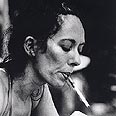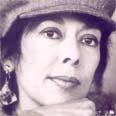

Yonah Wallach, a major poet and an outstanding personality in the history of Hebrew literature, died in 1985 from breast cancer. On her deathbed she decided to split her most precious legacy - her poems - between her then-lover, Yuval Rivlin, and her sister, Nira Schentzer.
Wallach, who was a crucial part of the Israeli bohemian arts communities in the 1960s known for her "unique combination of elements of rock and roll, Jungian psychology and street slang, breakneck pace and instant sexuality,” as one critic described her work, had been in the center of many scandals in her lifetime.
Today, 20 years after her death, her name has risen once again, and this time, risks setting off a major dispute between Orthodoxy and secularity in Israeli society over the danger of losing art treasures to religious forces.
In the midst of the story stands Rivlin, Wallach's last companion.
Rivlin, newly religious, holds two-thirds of the Wallach assets, including the copyrights of her poems. The rest of the property was inherited by the poet's sister.
Band kept from using lyrics
A few weeks ago when Rivlin was asked to allow the use of Wallach’s poems for a new album by the Israeli band “40 Degrees,” he refused to authorize publication of Wallach’s work.
The reason, apparently, is the explicit sexual content of her works, which, in the eyes of Rivlin’s rabbi, was better kept under wraps.
The post-modernist body of work Wallach left is undoubtedly one the most unconventional, controversial, enigmatic, yet major bodies in the Israeli poetry arena. The question to be asked is whether or not it is now doomed.
Her sister, Israeli musicians and the Israeli copyright organization “Acum” are warning that her creations may be lost.
Musician Ari Gorali, who is touring the country with “40 Degrees” and a new performance that includes songs by major Israeli poets, such as Yehuda Amichai, Dalia Rabikowitz, Rachel and Haim N. Bialik, Zelda and Wallach, is fearing for the future of her poetry.
“We recorded the songs, but now we won’t be able to produce the album,” he says. “It’s crazy. Artists want the world to be exposed to their art, and I have no doubt that Wallach, as with any other artist, wanted as many people as possible know her work. It’s absurd and unthinkable that the holder of the rights to her poems doesn’t allow her work to continue living and blocks access it."
Sister upset with ban
The fate of Wallach’s creations startled the peace of mind of her sister, as well.
“For years now we’ve been in a bitter legal battle with this man, and now he wants to erase Yona’s existence completely,” says Nira Schentzer. “With the advice of his rabbi he decided that her poems must not be heard or read? Tthat they are filth, abomination and that she must be done with? It’s disgraceful that he won't permit use of her poems."
Schentzer said it doesn't matter that he was her lover.
"I don’t know what to do," Schentzer says. "As far as I am concerned, let her work be heard, published and learned as much as possible. Otherwise it shall be lost.”
According to Schentzer, she wrote to “Acum,” the Israeli copyright organization, two years ago, in which she said: “I loathe Yuval Rivlin’s behavior, since with Yona’s money, possessions and the possessions of our dead parents, he knew how to use the money from Yona’s poems' royalties as well. The fact that he became Orthodox doesn’t allow him to forbid the publication of her works. Yona is a major figure in the Hebrew poetry world, and I’m afraid of this censorship.”
'Like the Taliban'
Rivlin did not respond to several messages left at his home answering machine.
Acun CEO Yorik Ben-David, says: “Our hands are tied because of a new ruling of the Israeli regulator. That’s a very disturbing issue that brings on the question of whether or not we, as a national entity, are in danger of losing our cultural treasures like it has been done by the Taliban, with the giant sculptures (they destroyed) in Afghanistan.
Ben-David says Wallach’s case is a symptom that emphasizes the danger of giving power to hands that would "use it for worse. In my opinion, no one has the moral right to conceal such treasures.”
Wallch herself wrote in the poem, “Let the words”:
Let the words act in you
Let them be free
They will enter you inside
Making forms upon forms
Will form in you that experience
Let the words act in you
They will do in you as they please
Remaking new forms in the thing
They will make in your thing
Exactly the same thing
For they are the thing they make
You will understand that they revive
For you that experience and its meaning like nature
Because they are nature and not an invention
And not a discovery
They will make the thing nature in you
Like giving sex is life to the word
Let the words act in you















